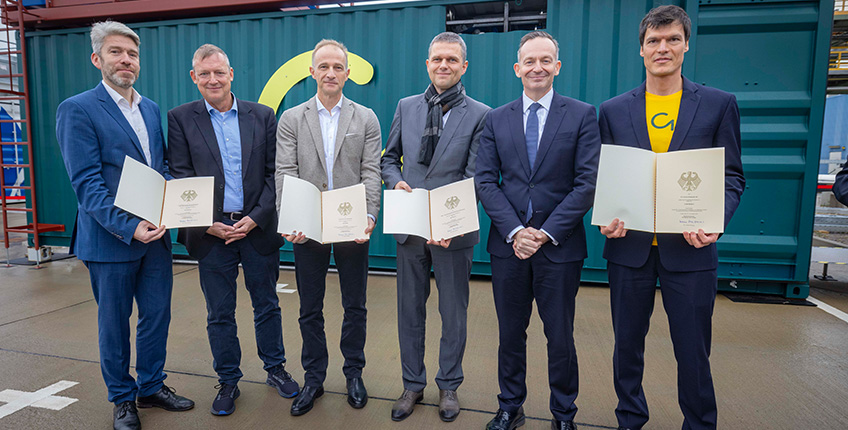The world’s first pilot plant for the cost-efficient production of green methanol was inaugurated today at the chemical park in Leuna as part of the “Leuna100” project by Federal Minister for transport, Dr Volker Wissing.
The project is backed by a research consortium consisting of the climate-tech start-up C1 Green Chemicals AG and its partners, the Fraunhofer Institute for Wind Energy Systems IWES, the Fraunhofer Institute for Environmental, Safety and Energy Technology UMSICHT, the DBI-Gastechnologisches Institut gGmbH Freiberg and the Technical University of Berlin. The aim is to use a fundamentally new production process to enable the cost-efficient market ramp-up of green methanol and thereby open up a climate-neutral fuel alternative for container shipping.
Novel process for the production of green methanol
The basis for the production of green methanol is a synthesis gas made from carbon monoxide and green hydrogen, meaning the hydrogen is produced using renewable electricity. Green methanol production in the “Leuna100” project consists of three steps: synthesis gas production, methanol production and purification of the raw methanol produced. C1’s innovative technology enables efficient low-temperature and low-pressure methanol production. This process is made possible by the use of a homogeneous, manganese-based catalyst system, which C1 developed together with the Leibniz Institute for Catalysis (LIKAT – Leibniz-Institut für Katalyse e.V.). The electricity-based and load-flexible utilisation of synthesis gas production and the homogeneous catalysis for methanol production together represent the core innovation.
Two different technologies for the CO2-based production of synthesis gas are coupled in the pilot plant: Fraunhofer UMSICHT is supplying a new low-temperature co-electrolysis system, while DBI – Gastechnologisches Institut gGmbH Freiberg is using a reverse water gas shift system. C1 is supplying the new catalyst and the specially developed reactor for the homogeneous catalysis of the methanol. Fraunhofer IWES is providing the site and infrastructure in the Hydrogen Lab Leuna and evaluating load flexibility. TU Berlin is developing an efficient, load-flexible operating concept based on a dynamic overall process model.
Industrial history at the Leuna Chemical Park
The project is being supported with funding totalling 10.4 million euros over the next three years by the Federal Ministry for Digital and Transport (BMDV – Bundesministerium für Digitales und Verkehr). Federal Transport Minister Dr Volker Wissing said at the opening ceremony: “Industrial history is being written in Leuna today. The project represents a milestone for the post-fossil age in shipping and aviation. We are proud to be supporting this ‘Made in Germany’ research project with funding as part of the overall concept for renewable fuels. With this overall concept, the BMDV is supporting the further development and market ramp-up of renewable fuels and consequently also the achievement of climate targets in the transport sector.”
BASF established the world’s first methanol plant in Leuna in 1923. Minister President of Saxony-Anhalt, Dr Reiner Haseloff, emphasised this historical context: “The Leuna chemical site can look back on a tradition of over a hundred years. During this time, it has confidently taken on challenges and repeatedly demonstrated its innovative strength. Now it has the opportunity to once again become the setting for the beginning of a new era. The ‘Leuna100’ project is making an important contribution to the beginning of circular chemical production, and not just in Saxony-Anhalt.”
Tankers, container ships and cruise liners are currently responsible for just under 3% of global annual carbon emissions. The new climate strategy adopted by the International Maritime Organisation (IMO) in summer 2023 aims to achieve climate neutrality by around 2050. By 2030, emissions are to be reduced by at least a fifth compared to 2008, and by at least 70% by 2040. Large shipping companies such as Maersk have already ordered methanol-enabled ships, the first of which have already been put into operation. Renewable fuels based on green hydrogen and CO2 also offer an alternative for the aviation industry. With a further processing step, jet fuel can potentially be produced from green methanol using the “alcohol-to-jet” process.
Christian Vollmann, CEO of C1 Green Chemicals AG: “Our innovative process offers the potential to produce green methanol more cost-effectively. We are delighted to have the opportunity to take our technology to the next level as part of the pilot plant, bringing us a decisive step closer to market launch.”
Prof. Dr Andreas Reuter, Director of Fraunhofer IWES, says: “With our many years of scientific expertise and a complex research infrastructure for renewable energies, such as the Hydrogen Lab in Leuna, Fraunhofer IWES is the ideal partner to successfully realise projects for the production of green fuels for the shipping and aviation industries.”
Background
The “Leuna100” project commenced in August 2023 at the Leuna Chemical Park and is scheduled to run for three years. It is being funded by the Federal Ministry for Digital and Transport with a total of 10.4 million euros as part of the overall concept for renewable fuels. The funding guideline for the development of renewable fuels is coordinated by NOW GmbH and implemented by the project sponsors VDI/VDE Innovation + Technik GmbH as well as the Fachagentur Nachwachsende Rohstoffe e. V. (Agency for Renewable Resources).
The working group lead by Prof Dr Matthias Beller from the Leibniz Institute for Catalysis (LIKAT – Leibniz-Institut für Katalyse e.V.), Rostock, is supporting the “Leuna100” project as a research partner.
Images of the research facility and other material are available here.
More information: www.leuna100.de
Original press release and press contacts: Leuna100
Image: © PPBraun


